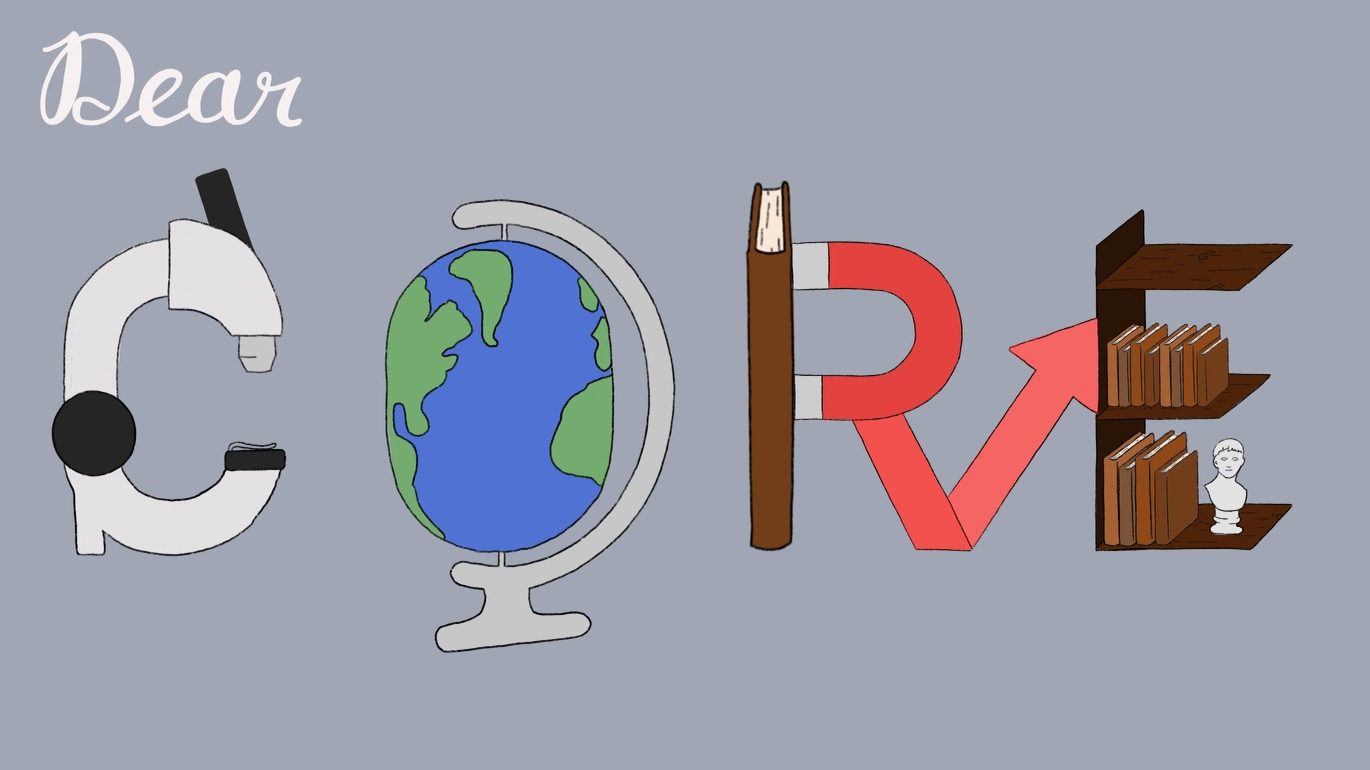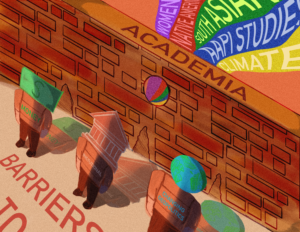The Core Curriculum. Even the very mention of its name is likely to elicit a reaction. For some, it’s a driving force behind a love of Georgetown, while it’s a significant roadblock to true passions for others. The dislike some students have for the core is understandable; it can feel somewhat outdated, given its origins in ancient Greek conceptions of education, which has led to a focus on subjects that don’t always translate into modern skills and interests. But there are upsides—at Georgetown, the core curriculum is an academic conception of the Jesuit value cura personalis, or care of the whole person, educating the whole person rather than just one part.
It’s easy to question why a core curriculum is still relevant today when it echoes an ancient idea of education focused on the humanities. Who really needs to scramble their brain trying to delve into the meaning of existence or whether God actually exists? Why do all humanities students need to struggle through calculus, or stats, or intro to computer science? At first glance, a lot of core requirements aren’t helpful in future careers—a fact that seems at odds with our campus’s often pre-professional culture.
But even if your Problem of God class doesn’t land you a consulting job, the core still has profound academic value for all students. In my experience, the way to make the most of the core curriculum is to view it as a tool that can either push you out of your comfort zone or help you add a new dimension to your chosen area of study. Both approaches add value to the Georgetown education and help us to become better rounded students.
For a long time, I’ve avoided studying philosophy—mostly because I’ve almost always been unsuccessful in engaging with any kind of deep philosophical argument. That was, until I decided to tackle my core philosophy requirement through the class “Intro to Philosophy via BoJack Horseman.” It spoke to my personal interest in over-analysing TV shows, and it focused on more contemporary readings and topics such as apology. The class provided insights into modern philosophical discussions that feel far more relevant and accessible to life than those that are usually presented in introductory philosophy classes. Without the push of the core curriculum, I might have made it through my entire degree without revisiting philosophy, and then, upon graduation, the opportunity would be gone.
Having overcome the challenge of my first philosophy requirement, I decided to use my required ethics class to enhance my public health minor by taking the class “Bioethics: Law and End of Life.” While the class counts only toward core requirements, it adds another dimension to the way I think about my chosen area of study, something I once wouldn’t have engaged with because the course isn’t included in my major and minor. It provides the philosophical roots of the health law class I’m taking for my minor and provides me with the tools to understand the background of healthcare laws in the U.S.
While approaching the core as a way both to branch out and to add dimension to current interests help us understand the benefits of the core curriculum, there’s also something to be said about pursuing knowledge for the sake of pure academic enrichment, something that we will be less able to do as we look to gain more “useful” skills that carry us into the professional world. In a world that increasingly focuses on “transferable skills,” “efficiency,” and just generally transforming people into the most streamlined marketable products possible, the core curriculum gives us permission and then actively pushes us to study almost anything and everything we could possibly think of. Classes as whimsical as “Art of the Book” and “Witches, Bitches, Bimbos” count towards a core requirement. The core carves out space in our schedules to really enjoy learning things that won’t necessarily be useful in the future; it asserts that knowledge has inherent value that can’t be commodified.
Many students complain about having to take classes that don’t necessarily align with their interests, but with a deep enough dive into the course catalogue, it’s possible to find gems that add a new dimension to your major or ignite a new interest. I’ve found that studies of ethics and philosophy, and even theology, are making me a better thinker—someone who can consider a question from many different angles and understand the academic roots of my arguments.
I find this holistic experience especially valuable after studying only one subject at my previous university. I spent my freshman year at University College London studying history, and history only. As I sat in my lectures, learning from some of the best professors in the world, I wondered what other knowledge was out there. Studying one subject in isolation cuts short the opportunity to build a well-rounded education that encourages complex thinking from many perspectives, rather than a single-minded approach. Georgetown’s core curriculum has given me a far more rewarding academic experience, through which I feel that I’m building more and more dimensional knowledge of each subject, and reaching a point where it all intertwines.
As I build my schedule for my last year at Georgetown, I’m struck by how little time I have left for pure academic exploration. Once we leave college, it’s unlikely that most of us will ever be able to single-mindedly apply ourselves to the pursuit of knowledge again, or have the encouragement of something like the core curriculum pushing us to do so. It’s easy to get caught up in taking what’s useful, or marketable, or will get us to graduation quicker. But the core curriculum offers the opportunity to cherish exploration for the sake of exploration and academic curiosity, and this is something that I wish was valued more by the Georgetown community.





